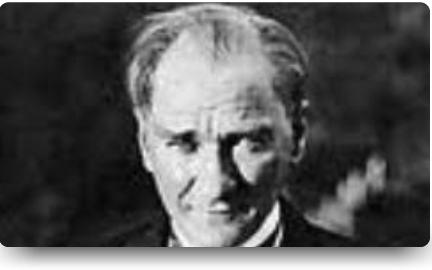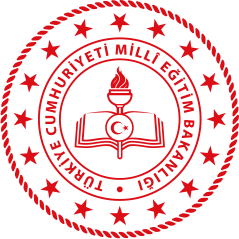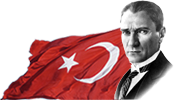
Mustafa Kemal Atatürk
“There are two Mustafa Kemals. One is the flesh-and-bone Mustafa Kemal who now stands before you and who will pass away. The other is you, all of you here who will go to the far corners of our land to spread the ideals which must be defended with your lives if necessary. I stand for the nation’s dreams, and my life’s work is to make them come true.” Ataturk stands as one of the world’s few historic figures who dedicated their lives totally to their nations. He was born in 1881 (probably in the spring) in Salonika, then an Ottoman city, now in Greece. His father, Ali Rıza, a customs official, died when Mustafa was still a boy. His mother, Zübeyde, a devout and strong-willed woman, raised him and his sister. First enrolled in a traditional religious school, he soon switched to a modern school. In 1893, he entered a military high school where his mathematics teacher gave him the second name Kemal (meaning “perfection” ) in recognition of young Mustafa’s superior achievement. He was thereafter known as Mustafa Kemal. In 1905, Mustafa Kemal graduated from the Military Academy in Istanbul with the rank of Staff Captain. Posted in Damascus, he started, with several colleagues, a clandestine society called “Homeland and Freedom” to fight against the Sultan’s governing the country. Mustafa Kemal’s career flourished as he won fame and promotions because of his heroism in the far flung corners of the Ottoman Empire, including Albania and Tripoli. He also briefly served as a staff officer in Salonika and Istanbul and as a military attaché in Sofia. When the Dardanelles campaign was launched in 1915, Colonel Mustafa Kemal became a national hero by winning successive victories and finally repelling the invaders. Promoted to general in 1916, at age 35, he liberated two major provinces in eastern Antalya that year. In the next two years, he served as commander of several Ottoman armies in Palestine and Aleppo, achieving another major victory by stopping the enemy advance at Aleppo. On May 19, 1919, Mustafa Kemal landed in the Black Sea port of Samsun to start the War of Independence. In defiance of the Sultan’s government, he rallied a liberation army in Anatolia and convened the Congresses of Erzurum and Sivas which established the basis for the new national effort under his leadership. On April 23, 1920, the Grand National Assembly was inaugurated. Mustafa Kemal was elected to its Presidency. Fighting on many fronts, he led his forces to victory against rebels and invading armies. Following the Turkish triumph at the two major battles at Inonu in western Turkey, the Grand National Assembly conferred on Mustafa Kemal the title of Commander-in-Chief with the rank of Marshal. At the end of August 1992, the Turkish armies won their ultimate victory. Within a few weeks, the Turkish mainland was completely liberated, the armistice signed, and the rule of the Ottoman dynasty abolished. In July 1923, the national government signed the Lausanne Treaty whit Great Britain, France, Greece, Italy, and others. In mid-October, Ankara became the capital of the new Turkish State. On October 29, the Republic was proclaimed and Mustafa Kemal Pasha was unanimously elected President of the Republic. The account of Atatürk’s fifteen-year presidency is a saga of dramatic modernization. With indefatigable determination, he created a new political and legal system, abolished the Caliphate and made both government and education secular, gave equal rights to woman, changed the alphabet and advanced the arts, sciences, agriculture and industry. In 1934, when the surname law was adopted, the national parliament gave him the name “Atatürk” (Father of Turks). On November 10, 1938, following an illness of a few months, the national liberator and the Father of modern Turkey died. His legacy to his people and to the world endures. "Everything we see in the world is the creative work of women." M.K. Atatürk "If war were to break out, nations would rush to join their armed forces and national resources. The swiftest and most effective measure is to establish an international organization which would prove to the aggressor that its aggression cannot pay."
M.K. Atatürk "Unless the life of the nation faces peril, war is a crime." M.K. Atatürk "This nation has never lived without independence. We cannot and shall not live without it. Either independence or death." M.K. Atatürk "I am convinced that the exercise of social and political rights by women is necessary for mankind´s happiness and pride. You can rest assured that Turkish women together with world`s women will work towards world peace and security."
M.K. Atatürk - 22 April 1935 "The death of Atatürk, who had saved Turkey during the war and revived the Turkish Nation after the war, is a great loss, not only for his country, but also for Europe as well."
-- Sir Winston Churchill My sorrow is that, there is no more possibility to fulfil my strong wish about the meeting with this man." Franklin D.ROOSEVELT

